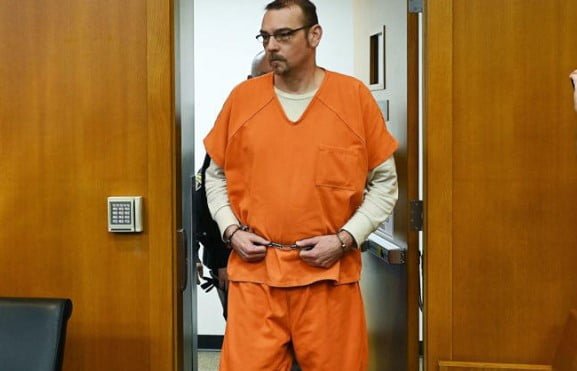
Michigan: Exposing the Crumbley Family Tragedy: A Father’s Manslaughter Trial Unfolds Amidst a Mother’s Conviction
Exposing the Crumbley Family Tragedy: A Father’s Manslaughter Trial Unfolds Amidst a Mother’s Conviction
As the curtains rose on yet another chapter of the heart-wrenching saga surrounding the tragic 2021 mass shooting at Oxford High School in Michigan, the spotlight now falls upon James Crumbley. Charged with four counts of involuntary manslaughter, James embarks on a legal battle fraught with complexities, mere weeks after his wife, Jennifer, faced the same charges and was convicted.
In the aftermath of the devastating events of November 30, 2021, James Crumbley stands accused of a grave offense: failing to avert the bloodshed orchestrated by his son, Ethan, who mercilessly claimed the lives of four students and left six students and a teacher wounded. With the prospect of a 15-year prison sentence looming over him, James adamantly maintains his innocence, pleading not guilty to the charges leveled against him.
The commencement of the trial saw a meticulous jury selection process unfold over the course of two days. Prospective jurors were subjected to probing inquiries, tasked with determining their ability to render impartial judgments in the face of the high-profile nature of the case. Delving into their beliefs regarding guns, parenting, and mental health, attorneys sought individuals capable of navigating the intricate web of legal nuances inherent in the proceedings. Ultimately, a jury comprising six men and nine women was empaneled, with the final composition of 12 jurors and three alternates to be determined randomly prior to deliberations.
The prosecution’s legal strategy, characterized by its innovative approach, seeks to assign culpability to the shooter’s parents, contending that their actions, or lack thereof, directly contributed to the tragic loss of innocent lives. In a departure from conventional legal precedent, prosecutors assert that the Crumbleys’ decision to furnish their son with a firearm and disregard warning signs of his deteriorating mental health warrants accountability for the ensuing fatalities.
The narrative woven by the prosecution resonates with broader societal implications, as it endeavors to redefine the parameters of accountability in the aftermath of mass shootings. While parental liability has historically been established in cases of neglect or firearms-related offenses, Jennifer Crumbley’s recent conviction marked a watershed moment in legal history, as she became the first parent of a school shooter held directly responsible for the ensuing carnage.
As the trial unfolds, parallels between James and Jennifer Crumbley’s cases emerge, underlining the shared complicity attributed to both parents. The presentation of evidence, testimony from shooting survivors, police investigators, and school personnel, collectively paint a sobering portrait of parental negligence and disregard for the ominous signs foreshadowing the impending tragedy.
Despite the semblance of symmetry between the two cases, inherent disparities surface, accentuating the unique dynamics at play within the Crumbley family. Notably, James’ purported familiarity with firearms and his role as the primary custodian of the household’s weaponry distinguish his culpability from that of his wife. The intricacies of his knowledge regarding Ethan’s mental health struggles and his involvement in pivotal events leading up to the shooting remain pivotal points of contention.
Furthermore, James’ legal defense strategy, along with the prospect of his testimony, introduces a layer of uncertainty into the proceedings. While Jennifer sought to deflect blame onto her husband and external parties during her trial, James’ defense may adopt a divergent approach, capitalizing on distinct evidentiary nuances to exonerate him from culpability.
Amidst the legal intricacies and adversarial proceedings, the specter of Ethan Crumbley looms large, casting a pall of despair over the courtroom. Having already pled guilty to a litany of charges and sentenced to life in prison without parole, Ethan’s absence from the witness stand underscores the profound ramifications of his actions on his family and the community at large.
As the trial progresses, the Crumbley family tragedy serves as a stark reminder of the indelible scars left in the wake of senseless violence. Beyond the confines of the courtroom, it compels society to confront the systemic failures and societal fissures that precipitated such a catastrophic loss of life, underscoring the imperative of collective introspection and reform.
In the crucible of justice, the fate of James Crumbley hangs in the balance, his future inexorably intertwined with the legacy of tragedy that has come to define his family. As the legal proceedings unfold, the quest for accountability converges with the pursuit of closure, offering a glimmer of hope amidst the darkness of despair.








